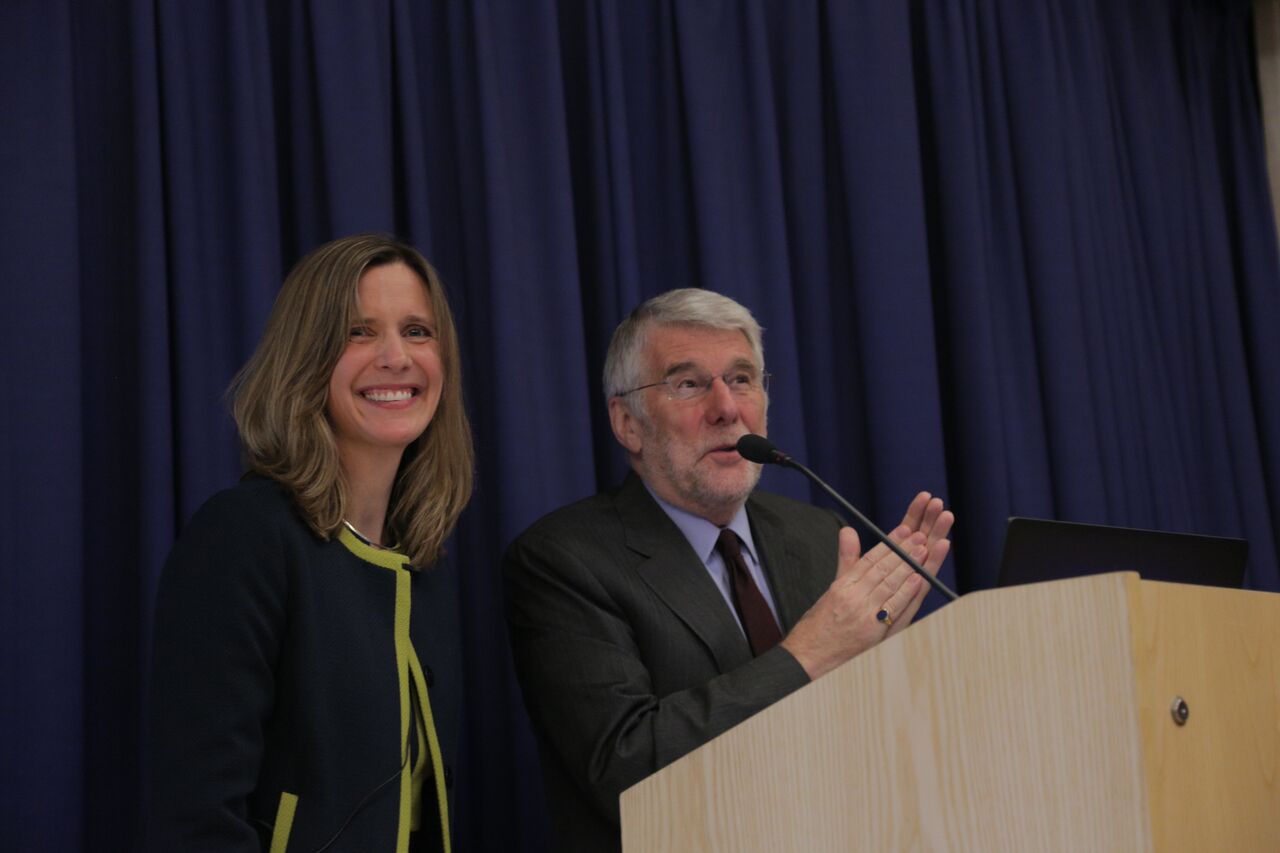
Sarah Hendriks delivered this year's Gates Cambridge Annual Lecture on how gender equality can change the face of poverty.
I am impatiently optimistic that we will have a more equal future which will unlock the potential for all people.
Sarah Hendriks
The Bill & Melinda Gates Foundation has identified the main barriers to equality for women and is working to tackle these in a bid to change the face of poverty.
Giving this year’s Gates Cambridge Annual Lecture, Sarah Hendriks, Director of Gender Equality at the Foundation, said the Foundation had spent the last year sifting through the evidence and working with partner organisations “to bring greater focus and clarity” on what was holding women back and how progress could be made.
The lecture, entitled What if…Gender equality could change the face of poverty?, gave the audience the first preview of the Foundation’s findings before they were launched for International Women’s Day.
Hendriks outlined to the audience how boosting women’s economic position would have wider social and health benefits for society, including intergenerational effects. She said research showed that women were more likely to invest any extra money they earned in improving the overall welfare of their households. Health and wellbeing gains transferred to their daughters who were less likely to have children at a very young age and more likely to work if they saw their own mothers working.
She outlined 13 elements which had the strongest impact on gender equality. Seven of these were key to driving change even if no one country followed the same process of empowerment. They were unpaid care work, education, financial inclusion, opportunities for decent work, delayed marriage, property and assets and family planning. The Foundation has been looking at the role it can play in advancing women’s economic empowerment and will focus on areas that hold the greatest potential for bringing change to the lives of low-income women and girls.
Impatient optimist
Hendriks said gender equality was “the driving engine of development”. Women and girls shouldered the burden of poverty, she said. They suffered first, suffered worst and recovered the last from economic downturns.
She pointed out how this inequality started from birth with girl infants less likely to survive than boys. She said unpaid care work disproportionately fell on women’s shoulders and, if it was paid, it was estimated that it would account for 13% of GDP. Although care work was vital for people’s survival, it often went uncounted and unvalued, said Hendriks. Women did three times more of this work on average than men, with women in South Asia doing 6.5 times more of this work than men. This shaped their economic lives and futures.
Hendriks highlighted how the gap between girls and boys widened at puberty due to caring responsibilities impacting on education. They were more unlikely to enter the workforce. When they had children they earned less than men.
Women had deeper, but less broad social networks than men which reduced their access to economic markets and health information. Hendriks referenced research showing how girls’ community area – the places where they felt safe – shrank dramatically as they got older while the opposite was true for boys. That made them more disconnected from each other and the services that could help them.
Hendriks also detailed how women often lacked a bank account and had trouble accessing capital. That meant they were often stuck in low growth, home-based enterprises. Laws over land ownership and inheritance were biased against women and they faced barriers to accessing justice.
It is calculated that gender equality could add $11 trillion to global GDP annually by 2025. Although reaching that equality is extremely challenging, Hendriks said she was optimistic because of the groundswell of interest in gender equality as a means to address sustainable development and poverty reduction. She added that the Sustainable Development Goals marked “a clear turning point” with their pledge to end gender inequality by 2030 and to address the underlying causes of inequality. That required a coherent plan that was evidence based.
Hendriks outlined the highlights of the first ever gender strategy by the Bill and Melinda Gates Foundation that is being launched this week. The focus of this strategy is to transform the way women participate in economies – with the understanding that taking charge of their economic future is one of the most profound ways for women to exercise power over their lives. Hendriks says this work will help more than 63 million women not only access and use digital bank accounts but make their own decisions about spending, saving, and building their own financial futures. It also aims to support the production of richer data and evidence to identify the most effective ways to ensure that low income women can participate more fully in the economy. Hendriks added that it would also expand what works among "self-help groups" to empower women, including younger segments of women, in India and Africa, to chart a better future for themselves and their families as well as supporting a deeper understanding of how economic assets can increase the opportunity of women, particularly those in the agriculture sector, to find work which is not on her farm and is outside of the home.
Hendriks finished by saying: “I am impatiently optimistic that we will have a more equal future which will unlock the potential for all people.”
*Watch Sarah Hendriks' lecture here. Picture credit: Sarah Hendriks with Gates Cambridge Provost Professor Barry Everitt.












